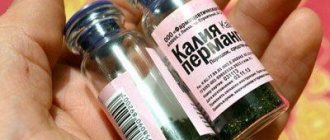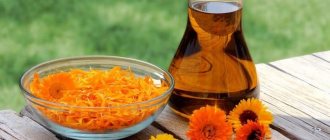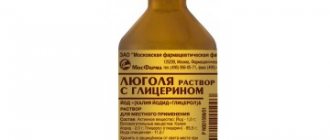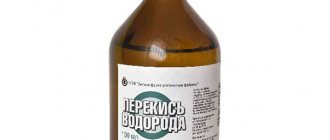Why gargle?
Sore throat is one of the main signs of the development of the inflammatory process. There are more than enough reasons for a sore throat. This could be an infection, an allergic reaction, or hypothermia. Pain may appear after excessive consumption of cold drinks, as well as when the mucous membrane is dry or injured.
To treat an inflammatory process in the throat, gargling is an effective remedy. This procedure helps relieve irritation
,
disinfect the mucous membrane of the throat
and mouth and
get rid of harmful bacteria
, which speeds up the healing process. Rinsing provides pain relief, sanitation, and also has an antiviral and antibacterial effect.
Gargles are prescribed for the following throat diseases:
- Catarrhal sore throat.
- Lacunar tonsillitis.
- Catarrhal pharyngitis.
- Hypertrophic laryngitis.
- Phlegmonous (purulent) laryngitis, etc.
Healing properties of the plant
Chamomile is considered one of the oldest medicinal plants. We have received information about the use of chamomile back in the Ancient World. It is possible that she was treated even before the formation of states. The plant is distributed throughout North America and Eurasia.
The main healing properties of chamomile decoction include:
- assistance in the restoration of damaged cells;
- good antiseptic properties;
- the ability to relieve swelling and inflammation;
- cleansing the mucous membranes and tonsils from plaque;
- analgesic properties;
- the ability to use chamomile as an immunomodulator: it helps the immune system cope with the disease;
- effectiveness in relieving itching;
- it facilitates the removal of gases from the intestines;
- stimulates digestive processes;
- Suitable for the treatment of kidney and genitourinary system diseases.
In addition, chamomile is used to create cosmetics, such as lotions and lipsticks. Chamomile is used to make facial compresses to help get rid of acne.
The abundance of beneficial properties is explained by the fact that chamomile contains more than 40 medicinal elements. The inflorescences contain nicotinic, ascorbic and salicylic acids. They also contain sugar, tannins, bitterness, choline, bisabolol, dioxycoumarin, chamazulene, mucus, pectin and other substances.
Chamazulene is the main component of the essential oil, which is contained in flowers up to 1.5%. It determines the main healing properties of chamomile. Flavonoids, luteolin and quercetin provide antimicrobial and antiviral effects. Fernesene and bezaboloxide help the body heal wounds faster.
The apigenin, herniarin and apiin contained in chamomile oil are natural antispasmodics. They dilate the blood vessels of the body and brain, reduce the effect of inflammatory processes. Flowers contain almost all the vitamins a person needs. They contain more than 10 micro- and macroelements needed by the body, including:
- zinc;
- nickel;
- cobalt;
- vanadium;
- magnesium;
- selenium;
- copper;
- iron;
- chromium.
All this led to the fact that chamomile began to be packaged and sold in pharmacies as a cheap and very effective means of combating diseases.
Following simple rules
When using chamomile products, follow some rules:
- only freshly prepared formulations are used;
- rinsing solutions should be warm;
- fresh flowers are collected away from industrial enterprises, roads, and railways;
- the collected plants are immediately washed thoroughly and then dried;
- decoctions and infusions are used as prescribed by a doctor.
Chamomile decoctions and infusions are used in cosmetology. They are effective and beneficial for the skin of the face and body.
How to gargle with chamomile?
Those who have never gargled with chamomile face difficulties of a purely psychological nature. In order not to be afraid of vomiting or liquid getting into the lungs, practice first in warm water:
- Inhale deeply, but not to the limit.
- Take some water into your mouth.
- Tilt your head back while slowly starting to release air through your open mouth.
- Release the air gradually so that the liquid gurgles longer in the mouth.
When gargling a sore throat with a medicinal decoction, you must take the following precautions:
- Do not rinse with hot tincture, because it will burn the mucous membrane. Chamomile should be just warm.
- Do not take a lot of broth at once. Firstly, it’s easier to rinse, and secondly, there’s less risk that liquid will get into the esophagus. If you do get it, there is no need to induce vomiting: the broth is not poisonous.
- When throwing your head back, do not overdo it so as not to squeeze your neck.
Doctors advise gargling up to 8-10 times a day. In practice, people rinse as often as they can, hoping for a speedy recovery. After your condition improves, take 4 times a day.
Gargling with chamomile for a sore throat will help, but treatment should not be limited to this. Consult your doctor and buy other medications.
Indications
Chamomile treatments are required for a large list of ENT diseases. Due to its strong antiphlogistic effect, it is recommended to be used for:
- tonsillitis;
- laryngitis;
- scarlet fever;
- sore throat;
- pharyngitis;
- stomatitis;
- inflammation of the gums.
The product reduces the occurrence of toothache, and also disinfects the oral cavity and removes swelling and inflammation.
How to brew chamomile for gargling?
A plant purchased at a pharmacy is best suited for preparing a decoction.
But if you have a summer house, you can collect chamomile yourself. You cannot pick the plant near highways and factories: there it becomes saturated with exhaust gases. To make it you need 1.5 teaspoons of crushed chamomile and water.
- Boil water and pour boiling water over chamomile. You can close the mug with a lid to infuse better.
- Wait 20 minutes.
- Strain the broth through a strainer. Discard the chamomile.
- Let the broth cool and gargle.
Brewing
Chamomile is sold in pharmacies, but in ecologically clean areas it can also be prepared independently. Only the pharmaceutical grade is used, the rest have no effect. How to brew chamomile for gargling? The classic recipe consists of dried flowers (1 tbsp), which are placed in a glass (200 ml). Then you need to pour boiling water.
The product should be covered with a napkin, and after an hour you can rinse. Preparing the infusion is not difficult, but you must take into account the doctor’s advice. In some cases, the dosage is lower, for example, for children.
How to brew chamomile for gargling with pharyngitis? For this ailment, both the classic recipe and other effective remedies are suitable. In any case, the effect of the procedures performed will be positive.
What parts of the plant are useful?
Studies have shown that the greatest effect is obtained when using baskets, that is, flowering inflorescences. They must be collected at the very beginning of flowering (from the beginning of June in most regions of Russia). At this time, the petals are positioned horizontally, and the receptacle is still flat.
Keep in mind that in open sunny areas, flowering begins earlier. Old, faded and fading buds are useless for medicinal use. If you plan to harvest the plant for bathing, you can tear off the stems and leaves.
Recommendations for procurement of raw materials
The raw materials for preparing chamomile medicinal products can be purchased at a pharmacy or prepared independently. To be sure of the high-grade “material” used, it is advisable to carry out all stages of preparing raw materials at home. In order to preserve all the beneficial substances, medicinal raw materials should be collected at the beginning of flowering. You only need to pick the inflorescences of pharmaceutical chamomile, they contain a larger amount of useful substances.
Before collecting a plant, you must ensure that it belongs to a medicinal species. To do this, you need to cut the flower into two parts and pay attention to the cut.
If there is a cavity inside, it means that the plucked sample has medicinal properties. Another way to determine the type of plant is to smell it. Medicinal chamomile should exude a honey-apple aroma.
Under favorable weather conditions, it takes about a week to dry the chamomile. During the process, the inflorescences should be mixed carefully, trying not to damage them. During drying, sunlight should not fall on the plants, and the air temperature should not exceed 400 C. The optimal mode for drying is 30 – 400 C.
When most of the moisture from the plant has evaporated and it becomes brittle, the grass should be packaged in bags. It is not recommended to use cellophane products; preference should be given to paper bags. If medicinal raw materials are planned to be prepared in large quantities, it should be taken into account that after drying, the mass of inflorescences decreases by 5 times.
Chamomile during pregnancy and breastfeeding: can you gargle?
Folk remedies are very popular during pregnancy, as women are afraid of harming their baby with potent medications. However, herbal decoctions often cause uterine contractions, which is strictly contraindicated during pregnancy.
When consuming chamomile, you need to know only a few nuances:
- Gargling with chamomile is absolutely safe, since the tincture does not enter the body directly;
- when taken orally, a strong infusion can cause uterine contractions and miscarriage. A weak tincture contains few phytoestrogens, and it does not increase the tone of the uterus;
- A safe dosage is considered to be no more than two teaspoons of chamomile per glass (250 ml) of water.
When breastfeeding, the use of chamomile infusions is also not contraindicated.
The medicinal plant cannot cause any complications or negative reactions in the unborn child. Therefore, doctors sometimes themselves prescribe chamomile infusion to nursing mothers. With mother's milk, the child receives numerous beneficial elements contained in chamomile.
The main thing is not to overdo it. Constant use is not required. Doctors prescribe chamomile in courses. The duration of the course is from 1 to 3 months. After it, you need to stop and switch to using another medicinal plant that has similar properties.
Chamomile decoction can be prescribed in the following cases:
- sleep disturbances and increased nervous excitability;
- respiratory diseases of the respiratory tract;
- skin diseases;
- inflammation of the genitourinary system;
- exacerbation of gastrointestinal diseases.
As you can see, chamomile is safe even when used internally, so gargling definitely won’t do any harm. You just need to make sure that the person does not have an allergic reaction.
Is it possible to give chamomile to newborns and infants?
The body of a newborn baby is very sensitive to any influences. Many herbs and traditional methods of treatment are contraindicated for children. Chamomile can be used, but with great caution, in small doses.
It has the same effect on a child’s body as on an adult:
- protects against bacteria;
- calms, normalizes sleep;
- strengthens the immune system;
- helps in healing scratches.
Chamomile is an allergen, so make sure your child reacts normally to it. Do an allergy test or give your child a very small dose of the decoction. If rashes occur, treatment should be stopped immediately.
If there is no allergy, the decoction can be used both internally and externally, that is, when rinsing. The problem is that a small child does not know how to gargle. Children learn to rinse with chamomile from about 5 years old. Therefore, brew weak tea and give it to your child. A drink in small doses will help against bloating, colic and intestinal gases.
When preparing a decoction, make the concentration weaker than for an adult. 1 teaspoon per glass of boiling water will be enough. Be sure to let the tincture cool so that your baby doesn’t get burned.
Do not give the decoction to a child who is not yet a few months old! His stomach is not yet strong and is not ready for such tests. An older toddler can be given 50 ml of decoction, distributed in parts.
It is best to consult a pediatrician before treatment.
Comparison with sage
For throat diseases, choosing a gargle is not difficult, since there are many medicinal drugs and folk remedies. But the question, sage or chamomile, which is better, will remain unanswered.
Gargling solutions have their own individual characteristics, are tolerated differently by people, and cannot help everyone.
Each human body reacts differently to one or another drug. For some, sage is effective, while others prefer other herbs. And various throat diseases. Therefore, the choice of drug is individual. And only a doctor can recommend alternative treatment.
Chamomile or calendula - a difficult choice
Folk recipes
Over the millennia, people have learned to use chamomile in many different ways.
- For dry and sore throat, brew a tablespoon of herb in a glass of water and add a teaspoon of honey.
- If your sore throat persists, combine chamomile with oak bark, sage, eucalyptus and other extracts.
- Inhalations have a powerful effect. Brew two tablespoons of chamomile in 500 ml of water and breathe in the steam from the solution for 15 minutes. Bend over the vessel and throw a blanket or thick cloth over your head to prevent the steam from escaping. Inhalations are prohibited for purulent sore throat!
- Do foot baths - they also affect the immune system and can help with a sore throat.
- Make a healing oil. Fill a glass jar to the top with herbs and add oil. After the composition has infused for several days, strain off the oil. Then lubricate the sore throat and tonsils with the product, after mixing it with regular vegetable oil in a 1:1 ratio.
- If your throat hurts due to a fungal disease, add a little boric acid to the gargling broth.
- To lose weight, mix a teaspoon of crushed strawberry leaves, St. John's wort, chamomile and birch buds. Pour the finished mixture with 2 cups of boiling water. After 12 hours it can be taken 100 grams twice a day. The decoction accelerates the removal of harmful substances from the body and optimizes salt metabolism.
- For cystitis, mix chamomile with St. John's wort, knotweed, corn silk and cornflower. Pour 400 ml of boiling water over them, strain after an hour. You need to drink immediately after eating.
Other recipes involve brewing chamomile tea. The herb can be combined with mint and lemon balm.
Contraindications
Chamomile is one of the most universal herbs, the use of which has no side effects and is suitable even for small children. However, it is not for nothing that it is called medicinal. This means that you should treat it accordingly. Otherwise, a harmless glass of herbal drink can harm the body or lead to exacerbation of chronic diseases.
A chamomile drink is not recommended for people with individual intolerance to this herb. An excessive concentration of chamomile in tea will do more harm than good. This drink can cause headaches, low blood pressure, upset stools, and weakened muscle tone. Constantly drinking too strong tea will harm your emotional state, leading to a prolonged depressed or irritable mood, and loss of attention.
It is advisable to avoid chamomile tea when taking medications with a sedative and diuretic effect. Chamomile has similar properties, and such a mixture will cause an overdose with the corresponding consequences.
You should not drink chamomile tea if you have diarrhea. Take it with caution if you have low blood pressure.
Pregnant women should avoid chamomile tea completely or take it in a weaker concentration, no more than one glass per day. The plant stimulates the formation of estrogen, which can cause miscarriage.











